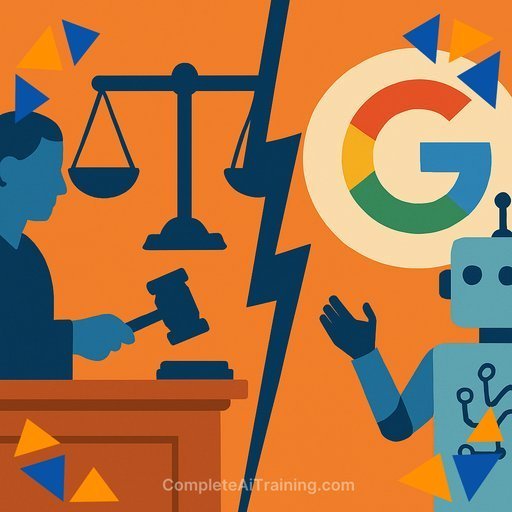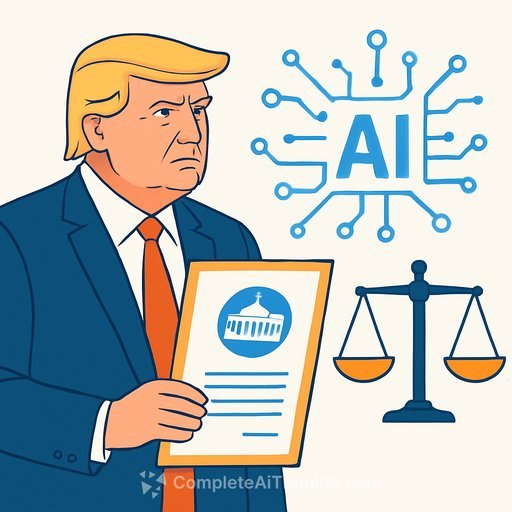Penske Media Sues Google Over AI Overviews: What Legal Teams Need to Know
Penske Media has filed suit against Google in federal court in Washington, D.C., alleging that Google's AI-generated summaries appropriate its journalism without authorization and depress referral traffic. This is the first major U.S. publisher to directly challenge Alphabet's use of AI Overviews in Search.
The case reaches beyond copyright. Penske contends Google leverages its search dominance to force publishers to allow use of their content in AI summaries or lose visibility in results, shifting costs and risk onto publishers while preserving Google's user engagement.
Core Allegations
- Google reproduces and summarizes protected reporting in AI Overviews without permission or payment.
- Visibility in Search is conditioned on allowing content use in AI summaries and for AI training.
- Google's market power (cited near 90% U.S. search share) enables these terms.
- Harm: ~20% of Penske-linked searches now show AI Overviews; affiliate revenue has fallen by more than one-third from peak due to traffic declines.
Google's Position
Google states AI Overviews improve user experience and broaden traffic distribution across sites. The company says users engage more with Search when Overviews are present and calls the allegations unfounded. Expect a defense grounded in product improvement, consumer benefit, and the argument that summaries are non-substitutive and link out to sources.
Parallel Developments
Chegg has brought a similar suit, alleging AI summaries suppress demand for original content and erode competitive standing. Industry groups, including the News/Media Alliance, argue Google's scale denies publishers a meaningful opt-out while other AI firms pursue licensing deals with publishers.
A recent antitrust ruling declined to require Google to divest Chrome in efforts to address Search competition, worrying publishers who see limited leverage for conduct remedies. For broader context on search litigation, see the U.S. v. Google case page from the Department of Justice: DOJ Antitrust: U.S. and Plaintiff States v. Google.
Key Legal Questions
- Copyright: Are AI Overviews and training uses fair use? Courts will examine purpose and character (transformative use), nature of the works, amount used, and market effect-especially substitution and revenue diversion.
- Antitrust: Does conditioning search visibility on AI usage constitute unlawful maintenance of monopoly power or tying? Plaintiffs will press market definition, share, exclusionary conduct, and anticompetitive effects.
- Unfair competition and unjust enrichment: Do AI Overviews free-ride on publisher investment and misappropriate value without compensation?
- Remedies: Is injunctive relief warranted to halt certain Overviews practices, require licensing, or provide an effective opt-out?
Evidence That Will Matter
- Internal Google communications about traffic substitution, click-through impact, and strategic goals for AI Overviews.
- Data tying the rollout of Overviews to traffic, conversion, and revenue declines for Penske properties.
- Technical policies and claims about opt-out mechanisms for summaries and training; feasibility of less restrictive alternatives.
- Consumer impact: whether Overviews reduce content discovery or simply reorganize it.
- Comparator behavior: licensing arrangements by other AI companies and any differential treatment by Google.
Risk Assessment for Publishers
- Search dependency: Concentration risk when one platform controls discovery and presentation.
- Content reproduction: Scope of summaries versus verbatim copying, and the presence of links, attribution, and potential confusion.
- Training exposure: Whether datasets included paywalled or subscriber-only material and what consents, if any, were secured.
- Damages modeling: Attribution of lost traffic and affiliate revenue to Overviews versus other market factors.
Possible Outcomes
- Conduct remedies: Clear opt-outs for summaries and training, changes to how Overviews display or attribute source content, or limits on snippet length.
- Licensing: Payment frameworks for use of publisher content in summaries or for model training.
- Monetary relief: Damages tied to traffic and revenue loss if liability is established.
- Status quo: If Google demonstrates procompetitive benefits and non-substitutive use, courts may allow Overviews to continue with minimal changes.
Action Items for In-House Counsel
- Inventory crawler access, robots/AI-specific directives, and any publisher controls relevant to AI summarization and training.
- Quantify referral shifts: Maintain time-series data on impressions, click-through rates, and revenue by search feature.
- Review terms: Ensure site terms address AI training, summarization, and automated extraction; preserve logs for enforcement.
- Prepare for discovery: Retain internal analyses of search dependency, traffic trends, and business impact from Overviews.
- Engage industry coalitions: Coordinate on standards and potential collective licensing frameworks.
Why This Case Matters
The dispute tests how far a dominant platform can go in presenting AI-generated summaries built on third-party reporting. It will help define the boundary between fair use, product integration, and compelled licensing in a market where distribution power and content creation are tightly intertwined.
If your legal team is building internal AI policies or evaluating licensing strategies by job function, you may find these resources useful: AI courses by job.
Your membership also unlocks:






